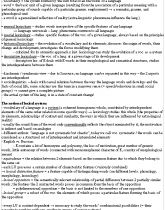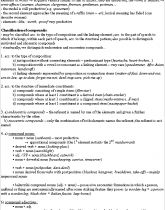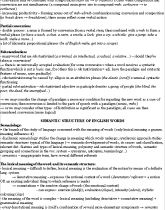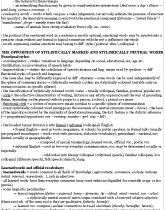Hledej
Zobraz:
Univerzity
Kategorie
Rozšířené vyhledávání
12 662
projektů
English Lexicology
| Přípona .doc |
Typ studijní materiál |
Stažené 0 x |
| Velikost 0,2 MB |
Jazyk anglický |
ID projektu 2464 |
| Poslední úprava 06.12.2013 |
Zobrazeno 1 892 x |
Autor: eliskabila |
 Sdílej na Facebooku
Sdílej na Facebooku |
||
| Detaily projektu | ||
- Cena:
1 Kreditů - kvalita:
79,7% -
Stáhni
- Přidej na srovnání
- Univerzita:Univerzita Karlova v Praze
- Fakulta:Filozofická fakulta
- Kategorie:Jazyky » Angličtina
- Předmět:Anglická lexikologie
- Studijní obor:-
- Ročník:-
- Formát:MS Office Word (.doc)
- Rozsah A4:25 stran
The object of lexicology:
- lexicology = lexis (word) + logos (learning)
- lexicology – the part of linguistics dealing with the vocabulary and the properties of words as the main units of language
- vocabulary = the system formed by the sum total of all the words of a language
- word = the basic unit of a given language (resulting from the association of a particular meaning with a particular group of sounds capable of a particular gramm. employment) → a semantic, gramm. and phonological unit
- a word is a generalized reflection of reality (extra-linguistic phenomena influence the lang.)
• general lexicology – studies words irrespective of the specific features of any language
→ language universals – lang. phenomena common to all languages
• special lexicology – studies specific features of the voc. of a given language; always based on the principles of general lexicology
• historical lexicology – the evolution of a vocabulary and its elements; discusses the origin of words, their change and development, investigates the forces modifying them
- criticized for its atomistic approach x hist. lexicology can study the evolution of a voc. as a system
• descriptive lexicology – the voc. of a lang. at a given stage of its development
- descriptive lex. of E deals with E words in their morphological and semantical structures, studies the interdependence between them
- diachronic / synchronic view – due to Saussure; no language can be separated in this way – the 2 aspects are interdependent
• sociolinguistics – deals with casual relations between the way the language works and develops and the facts of social life; some scholars use this term in a narrower sense (= speech behaviour in small social groups) → cannot give a complete picture
- the actual system of the lang. is in a state of constant change!
The notion of lexical system:
- vocabulary of a language is a system (a coherent homogenous whole, constituted by interdependent elements of the same order related in some specific ways) → lexicology studies this whole (the properties of its elements, relationships of contrast and similarity, the ways in which they are influenced by extra-lingual reality)
- usually the sound form of the word only conventionally reflects the object nominated by it; the motivation is indirect and based on analogies
- different authors: ‘language is not systematic but chaotic’; today we call voc. systematic / the words can be considered as a structured set of interdependent and interrelated elements
- English vs. Russian:
- E contains a lot of homonyms and polysemy, the loss of motivation, great number of generic words, little autonomy of words (connected with monomorphemic character of E, scarcity of morphological means)
- equivalence = the relation between 2 elements based on the common feature due to which they belong to the same set
- each LU possesses a certain number of characteristic features (variously combined)
→ lexical distinctive feature = a feature capable of distinguishing words (on different levels: phonology, morphology, lexicology)
- lexical opposition = the semantically relevant relationship of partial difference between 2 partially similar words; the features the 2 contrasted words posses in common form the basis of the opposition
• polydimensional opposition – the basis is not limited to the members of one opposition
- lexical group = a subset of the voc. the elements of which posses a particular feature forming the basis of the opposition
- lexicology = lexis (word) + logos (learning)
- lexicology – the part of linguistics dealing with the vocabulary and the properties of words as the main units of language
- vocabulary = the system formed by the sum total of all the words of a language
- word = the basic unit of a given language (resulting from the association of a particular meaning with a particular group of sounds capable of a particular gramm. employment) → a semantic, gramm. and phonological unit
- a word is a generalized reflection of reality (extra-linguistic phenomena influence the lang.)
• general lexicology – studies words irrespective of the specific features of any language
→ language universals – lang. phenomena common to all languages
• special lexicology – studies specific features of the voc. of a given language; always based on the principles of general lexicology
• historical lexicology – the evolution of a vocabulary and its elements; discusses the origin of words, their change and development, investigates the forces modifying them
- criticized for its atomistic approach x hist. lexicology can study the evolution of a voc. as a system
• descriptive lexicology – the voc. of a lang. at a given stage of its development
- descriptive lex. of E deals with E words in their morphological and semantical structures, studies the interdependence between them
- diachronic / synchronic view – due to Saussure; no language can be separated in this way – the 2 aspects are interdependent
• sociolinguistics – deals with casual relations between the way the language works and develops and the facts of social life; some scholars use this term in a narrower sense (= speech behaviour in small social groups) → cannot give a complete picture
- the actual system of the lang. is in a state of constant change!
The notion of lexical system:
- vocabulary of a language is a system (a coherent homogenous whole, constituted by interdependent elements of the same order related in some specific ways) → lexicology studies this whole (the properties of its elements, relationships of contrast and similarity, the ways in which they are influenced by extra-lingual reality)
- usually the sound form of the word only conventionally reflects the object nominated by it; the motivation is indirect and based on analogies
- different authors: ‘language is not systematic but chaotic’; today we call voc. systematic / the words can be considered as a structured set of interdependent and interrelated elements
- English vs. Russian:
- E contains a lot of homonyms and polysemy, the loss of motivation, great number of generic words, little autonomy of words (connected with monomorphemic character of E, scarcity of morphological means)
- equivalence = the relation between 2 elements based on the common feature due to which they belong to the same set
- each LU possesses a certain number of characteristic features (variously combined)
→ lexical distinctive feature = a feature capable of distinguishing words (on different levels: phonology, morphology, lexicology)
- lexical opposition = the semantically relevant relationship of partial difference between 2 partially similar words; the features the 2 contrasted words posses in common form the basis of the opposition
• polydimensional opposition – the basis is not limited to the members of one opposition
- lexical group = a subset of the voc. the elements of which posses a particular feature forming the basis of the opposition
Klíčová slova:
lexicology
motivation
prefixes
suffixes
hybrids
homonyms
vocabulary
Obsah:
- MORPHOLOGICAL STRUCTURE OF ENGLISH WORDS
COMPOUND WORDS
SHORTENED WORDS AND MINOR TYPES OF LEXICAL OPPOSITION
CONVERSION AND SIMILAR PHENOMENA
SEMANTIC STRUCTURE OF ENGLISH WORDS
SET EXPRESSIONS
HOMONYMS
SYNONYMS AND ANTONYMS
ENGLISH VOCABULARY AS A SYSTEM
THE OPPOSITION OF STYLISTICALLY MARKED AND STYLISRICALLY NEUTRAL WORDS
DIFFERENTIATION WITH RESPECT TO TIME AXIS
REGIONAL VARIETIES OF THE ENGLISH VOCABULARY
NATIVE WORDS VERSUS LOAN WORDS



